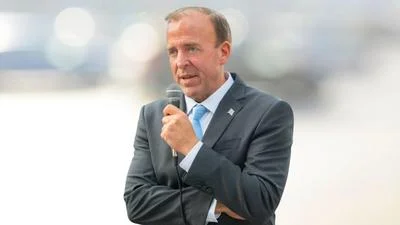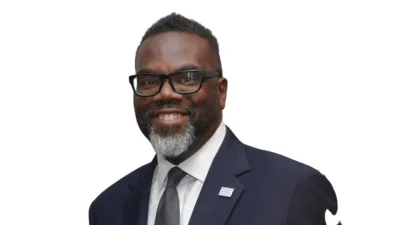Chicago Mayor Brandon Johnson presenting his "people's budget" for FY2024. | Chicago Mayor's Office / Facebook
Chicago Mayor Brandon Johnson presenting his "people's budget" for FY2024. | Chicago Mayor's Office / Facebook
Chicago Mayor Brandon Johnson on Wednesday presented his first budget to the City Council.
The $16.6 billion spending plan avoids layoffs, calls for holding the line on property taxes, and bridges a projected $538 million budget shortfall by tapping nearly $434 million in tax increment finance district — including an additional $50 million in 2022 surplus funds.
Johnson helped fill the budget shortfall by boosting revenue projections, cutting $112.6 million through so-called "operational efficiencies" and nearly $90 million in bond refinancing. He dubbed his first spending plan as the "People's Budget."
“I’m proud to present a budget that reflects both our challenges and our opportunities to begin the critical investments necessary to build a better, stronger, safer Chicago. This budget is the people's budget; we will ensure that every resident of this city can thrive in peace and prosperity, connected to all the amenities and resources they deserve," Johnson said in a statement.
Missing from Johnson's first budget were controversial revenue plans that he pitched during his campaign, including proposals to bring back a corporate employee tax, increase hotel taxes, charge a fee on security trades, and boost the city's tax on jet fuel.
The budget, which requires City Council approval, calls for:
- Maintaining funding levels for the police department and increasing the number of police detectives.
- $53 million in spending for replacing lead water lines citywide.
- Paying down the city's debt principal by about $1 billion.
- Earmarking $76 million for youth jobs and programming.
- More than $15 million per year for mental health services, including expanding the public health department's mental health staff in clinics and the 911 response team by nearly 75 percent as well as supporting two additional mental health clinics in existing health department offices.
- Earmarks about $100 million for anti-violence programming; restorative justice, reentry work; domestic violence and gender-based violence prevention and intervention; and the City’s Community Safety Coordination Center.
- $250 million in "homelessness supports."
- Re-establishing the Department of Environment.






 Alerts Sign-up
Alerts Sign-up